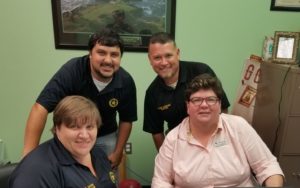
(From top left to right, clockwise) Sheldon Cortez: ACO, Rene Vasquez: Director of Ft. Bend Animal Services , Alice Burton, Alley Cat Allies, and Barbara Vass: Community Involvement Coordinator
Fort Bend County, Texas, has joined hundreds of other communities around the nation that provide lifesaving Trap-Neuter-Return (TNR) programs for community cats. Alley Cat Allies was there when the County Commissioners adopted the ordinance in June. We returned to the county in July to create programs to ensure Fort Bend’s success with TNR.
The new ordinance allows community cats brought to the local animal shelter to be returned to their outdoor homes as part of a TNR program. The commissioners, in amending the animal control ordinance, also added the definition of “community cats” to differentiate them from owned cats.
“We are thrilled that the shelter can now practice TNR for the benefit of cats and the community,” says Becky Robinson, president and founder of Alley Cat Allies, which has worked with the shelter on efforts to save and protect cats. “The shelter staff is enthusiastic and passionate about saving cats’ lives, and their hard work is paying off.”
Fort Bend County Animal Services has achieved a save rate of more than 90 percent for dogs, but only a 53 percent save rate for cats. Providing TNR to community cats will no doubt boost the rate for cats, says Rene Vasquez, director of Fort Bend County Animal Services.
Through TNR, community catswho are not socialized to people and are unadoptableare humanely trapped, spayed or neutered, eartipped, and returned to their outdoor homes. Instead of killing countless community cats through the cruel and ineffective practice of impounding them, shelters that implement TNR decrease cat intake and free up resources to care for adoptable animals. TNR programs decrease “euthanasia” rates, calls of concern to animal control, and the amount of taxpayer money spent on killing cats.
Fort Bend County is proud to count itself among 48 Texas communities with lifesaving TNR ordinances. It is now part of a compassionate nationwide network of cities and counties that are saving cats’ lives and benefitting residents every day through TNR.
“I knew TNR was what we needed,” Vasquez says. He called the amended ordinance a “great accomplishment, which we have been fighting for with a lot of help” from individuals and groups, including Alley Cat Allies.
Alice Burton, associate director of Animal Shelter & Animal Control Engagement at Alley Cat Allies, traveled to Fort Bend in July to train the animal control officers and shelter staff on how to operate an effective TNR program. She helped officials create the policies and procedures to support a successful and well-run program. She also hosted training sessions for animal control officers at Fort Bend County Animal Services, volunteers, community members, and others.
Burton also visited Fort Bend County Animal Services back in February to promote TNR and help the shelter implement a Wait Until 8 program to help kittens. The program offers resources to people who find kittens and bring them to the shelter, encouraging them to care for the kittens at home until they reach 8 weeks of age. This keeps kittens out of the shelter until they are old enough to be spayed or neutered and put up for adoption. Alley Cat Allies has also been providing supplies and educational resources to the shelter for months.
Fort Bend County Animal Services isn’t letting any time pass now that it has its ordinance in place. Alongside asking Alley Cat Allies for assistance and education, it is launching TNR pilot programs in two areas where it has identified large numbers of community catsthe cities of Needville and Richmond.
Vasquez says he looks forward to working with Alley Cat Allies as the shelter implements the pilot programs and works to make the public aware of these changes.
“I know this isn’t going to be easy,” he says, “but the end result is going to be really good.”

